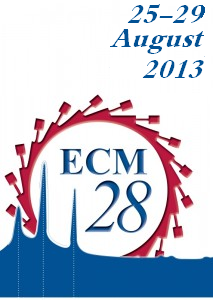The organisers are delighted to announce that ECM28 will host a special symposium organised by the Bragg Lecture Fund Committee to mark the Bragg Centenary, on 26 August 2013. Bragg Lectures are usually awarded by the committee every three years, but to mark this special anniversary, three lectures have been awarded for a symposium at the ECM 28 meeting in Warwick in 2013:
Prof John Jenkin, biographer of William and Lawrence Bragg
La Trobe University, Australia
William and Lawrence Bragg: time for resurrection!
Dr Airlie McCoy
University of Cambridge, UK
Phasing crystals with single atoms: a century of progress
Prof Bill David
ISIS Facility RAL and University of Oxford, UK
100 years of X-ray crystallography – the continuing Bragg legacy
Chair: Prof Richard Catlow, FRS, University College London.
John Jenkin was born and raised in Adelaide, South Australia, is a graduate of the University of Adelaide and of the Australian National University, Canberra, and held postdoctoral appointments in the UK (AERE, Harwell) and the USA (Univ. of Minnesota). In 1968 he joined the Physics Department of La Trobe University, Melbourne, where he became a professor and head of department. He spent the last decade of his career in the history & philosophy of science program of the Faculty of Humanities at La Trobe. In physics his research included nuclear and condensed-matter physics, and in the humanities the historyof the physical sciences in Australia, with an emphasis on biography. Long retired, he is an Emeritus Scholar of La Trobe University. His major recent work is John Jenkin, William and Lawrence Bragg, Father and Son (Oxford: OUP, 2008hb, 2011pb).
Airlie McCoy first heard about crystallography in the Bragg lecture theatre as an undergraduate at the University of Adelaide, and was inspired to go on and complete a PhD in crystallography at the University of Melbourne. She is now based at the University of Cambridge. In addition to the study of structure and function of proteins, most recently in the area of protein transport between intracellular compartments, she has contributed to the
development of software tools that protein crystallographers use for phasing X-ray data, including Phaser and the PHENIX suite. Airlie is committed to teaching crystallography, and has lectured and tutored at many crystallography schools.
Bill David is an STFC Senior Fellow at the ISIS Facility, Rutherford Appleton Laboratory. He is also a Fellow in Physics at St. Catherine’s College, Oxford and Visiting Professor in the Inorganic Chemistry Laboratory, Oxford where he has a research group that focuses on materials for energy storage. Bill’s supervisor “twice-removed” was W H Bragg – the lineage being Mike Glazer, Kathleen Lonsdale and then William Henry Bragg himself. A small amount of research has shown that this close link to one of the Braggs is not an uncommon occurrence among British crystallographers. Indeed, one hundred years on, the combined impact of both W H and W L Bragg on the world of crystallography and on British crystallography in particular is still strong.

